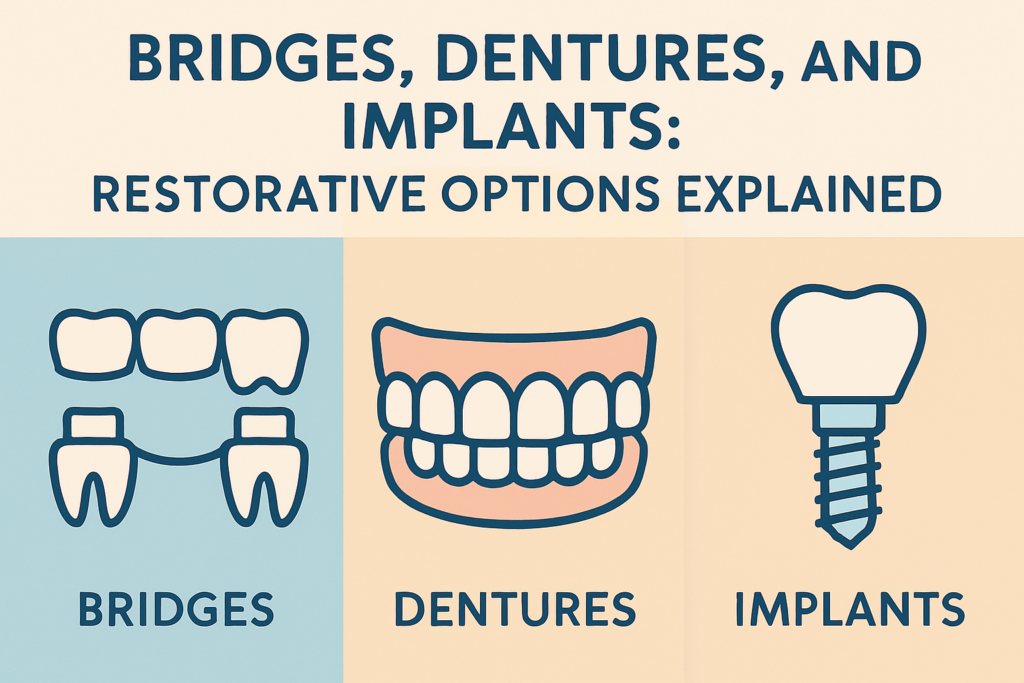Home » Bridges, Dentures, and Implants: Restorative Options Explained

Far East Dental Centre | Restorative Dentistry in Edmonton
Call Us: +1 780 428-2288
Applicational Dental Treatment Procedures: Very modern procedures and restorations are available today for replacement of missing teeth. Tooth loss can be due to trauma, caries, or gum disease. Whatever the cause of tooth loss, restorative dentistry employs methods whereby one can get a restored smile, confidence, and ability to chew comfortably or even speak comfortably.
Nowadays, dental bridges, dentures, and implants are the three most preferred treatment modalities. Each, depending on the case, would have associated advantages and disadvantages, sometimes also giving way to a patient’s preference.
Far East Dental Centre, Edmonton, specializes in Restorative Dentistry in Edmonton with all age groups for the right solution unique to their requirements. The very first step towards restoring your smile is to bring forth the options available for missing one or more teeth.
Now, let’s talk about the bridges, dentures, implants, and their comparison.
Restorative Dentistry is any procedure undertaken to repair or replace damaged or missing teeth. The goal is to restore the mouth to full functioning-it has to be able to eat, talk, or smile easily.
With Far East Dental Centre, our restorative services were designed for restore function, oral health, and smile forever. Whether you need a single tooth replaced or full-mouth reconstruction, we can walk you through your options.
A dental bridge is an immovable appliance that simply bridges the space created by one or more missing teeth. It comprises one or more pontics fabricated to crown two neighboring natural teeth or implants.
A traditional bridge involves reshaping the teeth adjacent to the gap and crowning these teeth. These crowns then serve to cement the artificial tooth or teeth in between, culminating in a restoration smooth and functional.
Best for: Patients with one or more missing teeth who have healthy surrounding teeth.
Another complementary definition of a denture can be a removable apparatus that is capable of substituting many teeth. This definition can be afforded when several teeth or all teeth from the upper or lower jaw are missing.
There are two main types:
Made from acrylic, sometimes Australians use metal as well for strength, these are custom-designed dentures to fit your mouth.
Dentures rest on the gums and are retained either through natural suction or with the assistance of dental adhesives. Partial dentures frequently use metal clasps to attach to remaining teeth.
Best for: More than one or all of the teeth have been missing for some time, especially those wishing for a solution non-surgical and somewhat cheap.
The dental implant is considered a slight titanium post to substitute the root of an absent tooth. It is surgically implanted into the jawbone where it becomes united with the bone through osseointegration. Healing occurs next, after which the crown, bridge, or set of dentures may be mounted on it for function and outlook.
Dental implants stand as a durable solution that lasts the longest in perfect Restorative Dentistry.
Implants follow a few steps:
Implants can be used for the support of a single tooth, multiple teeth, or an entire arch.
Best for: Patients looking for a long-term one with a lot of maintenance if the patient is in good oral and general health.
Here’s a side-by-side comparison of the three main restorative options:
| Feature | Dental Bridge | Denture | Dental Implant |
| Appearance | Natural-looking | Improved, but may look artificial | Most natural-looking |
| Durability | 5–15 years | 5–10 years | 20+ years, often lifelong |
| Functionality | Good | May shift or affect speech | Excellent |
| Cost | Moderate | Lowest | Highest (initially) |
| Invasiveness | Minimal | Non-invasive | Surgical procedure |
| Bone Loss Prevention | No | No | Yes |
| Care Required | Brushing & flossing | Daily removal and cleaning | Same as natural teeth |
The right restorative option depends on several factors, including:
Here at Far East Dental Centre, we don’t believe in a one-size-fits-all solution. Our team takes the time to assess your dental history, take high-quality imaging, and have an honest conversation with you about what makes sense—medically, cosmetically, and financially.
At Far East Dental Centre, we provide Restorative Dentistry Services Edmonton designed uniquely for you to restore that smile. We stand by you any time, whether you are just beginning to look at your choices or ready to go ahead with the actual treatment.
Reasons why patients across Edmonton choose us for restorative dentistry:
Call us today at +1 780 428-2288 to arrange a consultation and learn which Restorative Treatment option is right for you.
Definitely, if you plan for the long-term and tough. Implants initially tend to be very costly. Also, it’s worth noting that they could save you money from thereafter as they do not need replacement or further repairs.
Most insurance cover at least a portion of restorative procedures. Bridge and denture payments are definite. However, coverage for implants varies, and in this case, you will want to speak to your provider or call us so we can assist you in verifying your benefits.
Depending on the treatment plan, dentures could be ready as soon as a couple of weeks. Further adjustments and temporary dentures could be required.
Yes! Each option restores chewing ability to some extent. Implants offer the closest experience to natural teeth, but all three are functional.
From one or more missing teeth, it surely might be a hard experience. Conversely, modern dentistry can treat patients reliably, safely, and with life-enhancing procedures for restoring happiness to their smile.
Whether it is a bridge or dentures that you choose to have, or an inquiry pertaining to implants, getting started is really the main thing. Do not let your self-esteem be affected by your missing teeth. Neither should you let a lack of teeth affect your nutrition or the quality of your life.
Allow the caring and professional team at the Far East Dental Centre to review your options for restoratives.
Call Now: +1 780 428-2288
Your smile is worth restoring- Let’s give it back together.

Your trusted provider for General, Restorative, and Emergency Dentistry.